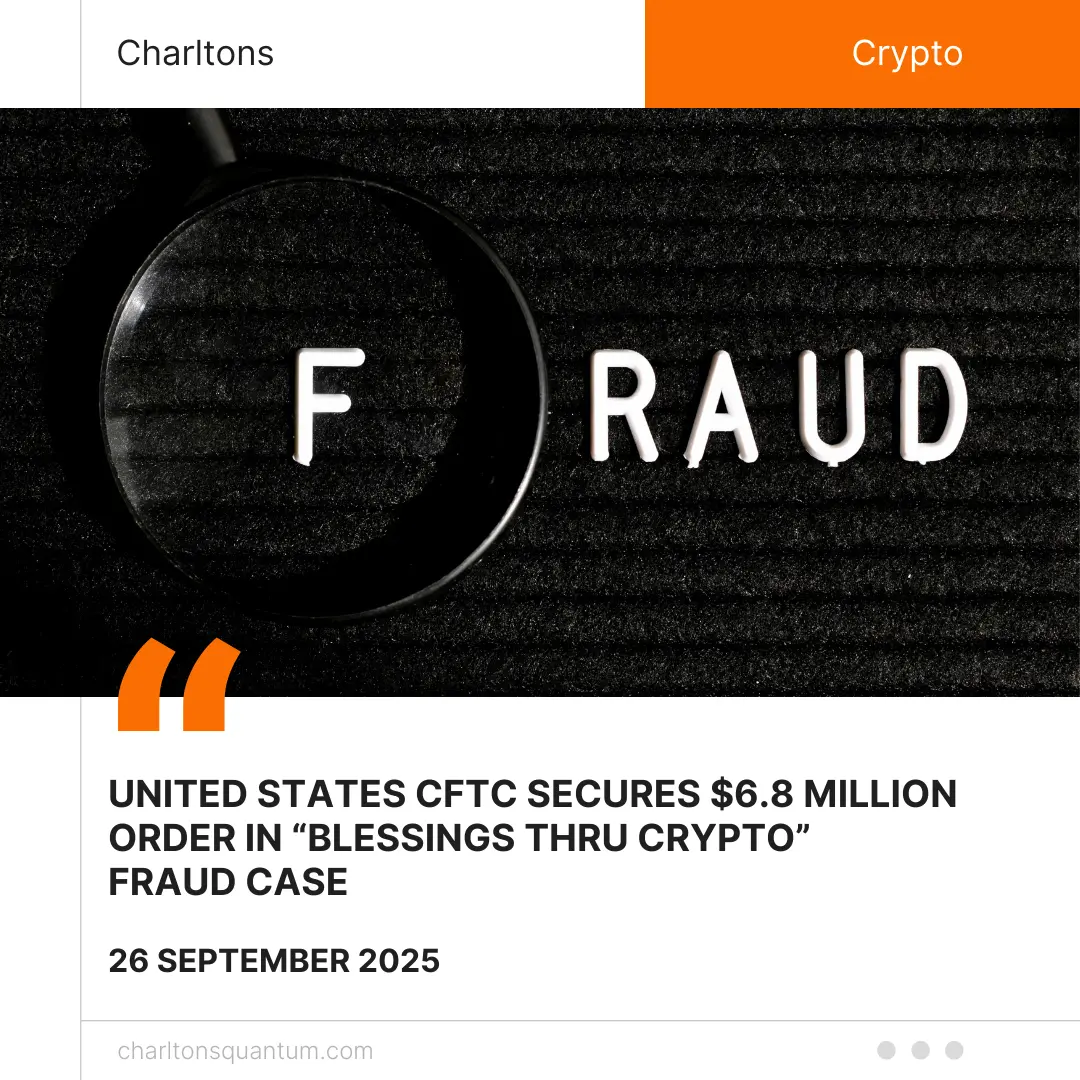
On 25 September 2025, the United States Commodity Futures Trading Commission (US CFTC) announced that the U.S. District Court for the Middle District of Tennessee entered a Consent Order for Permanent Injunction, Civil Monetary Penalties, and Other Statutory and Equitable Relief against Michael Griffis and Amanda Griffis. The Tennessee couple, who operated a fraudulent pool called “Blessings Thru Crypto”, are ordered to pay US $5,528,121 in restitution to defrauded participants and a US $1,355,232 civil monetary penalty, totalling more than US $6.8 million in monetary relief. The order permanently bans the defendants from trading or registering with the US CFTC and prohibits further violations of the United States Commodity Exchange Act and related regulations.
The Griffises’ activities spanned several years and culminated in a formal enforcement response. In July 2023, the US CFTC initiated proceedings alleging fraud in connection with the commodity pool. The court’s findings confirmed that investor funds were neither traded as promised nor secured in regulated venues. Instead, substantial portions were dissipated across unverified offshore accounts. By 25 September 2025, the court entered a consent order requiring restitution, civil monetary penalties, and imposing permanent bans.
The US CFTC filed its Complaint on 24 July 2023 seeking injunctive and monetary relief for violations of Sections 4b(a)(2)(A)–(C), 4m(1), and 4o(1)(A)–(B) of the United States Commodity Exchange Act, and Regulations 4.20(a)–(c), 4.21(a)(1), and 4.22(a), (c).
The Consent Order establishes that between July 2022 and January 2023, the defendants solicited at least 145 individuals across the United States, raising more than $6.38 million. They claimed the funds would be pooled for commodity futures trading on the “Apex Trading Platform” with the support of an adviser known as Coach Wendy. In reality, no futures trades occurred, more than $4.1 million was diverted to an illegitimate overseas exchange, and over $1.35 million was misappropriated for personal use.
Fraudulent Solicitations and Misrepresentations under the mask of Crypto earnings
The U.S. District Court for the Middle District of Tennessee found that the defendants promised exaggerated profits while failing to disclose risk, falsely claimed that the pool was “legal,” and misrepresented the safety of participant funds. They also invented trading records and spreadsheets purporting to show daily profits, when no trades occurred.
“Defendants, acting individually and in concert, further committed fraud while acting as unregistered commodity pool operators by pooling funds, purporting to trade those funds in futures but not engaging in a single futures trade, misappropriating pool participant funds, and refusing to honour withdrawal requests.”
The couple also promoted the expertise of “Coach Wendy,” whose identity remains unknown, and used WhatsApp groups to perpetuate the illusion of trading success
US CFTC Enforcement and Statement
Commenting on the case, Charles Marvine, Acting Chief of the Division of Enforcement’s Retail Fraud and General Enforcement Task Force, stated:
“This case is a stark warning to be cautious about whom you trust with your money. If an investment opportunity seems too good to be true, it almost certainly is, for you and anyone you bring along.”
“In reality, the platform was an illegitimate copy of an overseas exchange, and the true identity of Coach Wendy remains unknown. More than $4 million of the pool’s funds were sent to the illegitimate overseas exchange where it was immediately sent to a variety of other accounts and offshore trading platforms. The remaining funds were misappropriated for personal expenses including paying personal debts and buying a variety of consumer goods.”
Retail investors remain highly vulnerable to fraudulent offerings, particularly where digital asset products are marketed through personal or community networks.
(Source: https://www.cftc.gov/PressRoom/PressReleases/9133-25)





